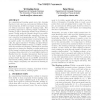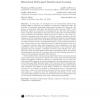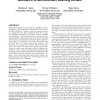584 search results - page 22 / 117 » Reinforcement Learning Task Clustering |
GECCO
2005
Springer
15 years 8 months ago
2005
Springer
Recurrent neural networks are theoretically capable of learning complex temporal sequences, but training them through gradient-descent is too slow and unstable for practical use i...
118
Voted
AR
2007
15 years 2 months ago
2007
—Reinforcement learning is the scheme for unsupervised learning in which robots are expected to acquire behavior skills through self-explorations based on reward signals. There a...
126
click to vote
KCAP
2009
ACM
15 years 9 months ago
2009
ACM
As computational learning agents move into domains that incur real costs (e.g., autonomous driving or financial investment), it will be necessary to learn good policies without n...
179
Voted
AGENTS
2001
Springer
15 years 6 months ago
2001
Springer
In this paper, we investigate the use of hierarchical reinforcement learning (HRL) to speed up the acquisition of cooperative multi-agent tasks. We introduce a hierarchical multi-a...
122
click to vote
GECCO
2006
Springer
15 years 6 months ago
2006
Springer
Both genetic algorithms (GAs) and temporal difference (TD) methods have proven effective at solving reinforcement learning (RL) problems. However, since few rigorous empirical com...



